 August 1, 2009 - Fake Victory Light cigarettes are in circulation on the Bulgarian market, and batches of them were intercepted in Kyustendil and Blagoevgrad, Bulgarian National Television (BNT) said on July 28 2009.
August 1, 2009 - Fake Victory Light cigarettes are in circulation on the Bulgarian market, and batches of them were intercepted in Kyustendil and Blagoevgrad, Bulgarian National Television (BNT) said on July 28 2009.
Bulgartabak Holding, maker of Victory Light - long the brand leader among smokers in Bulgaria said the apparent discrepancies are in the packaging, ingredients and the lack of an excise stamp.
Peripherally, the differences are only visible with the Victory logo, which on the original cigarettes is printed on the filter whereas on the fake ones is on the stem of the cigarette. After chemical and physical analysis, it was revealed that the bogus cigarettes are made of low-grade tobacco, of which "the bare minimum was used". Subsequently, they caused hoarseness, a bad after-taste, increased irritation, "burning sensations", and bitterness. Moreover, nicotine levels grossly exceeded the acceptable norms.
"The fakes have darker type of tobacco, with a strange scent to it," said Antonio Zashev, head of Technological and Quality Control at Bulgartabak. Bulgartabak said that the fake cigarettes could prove to be very dangerous.
"The worst part of the matter is that we don't know where they come from and what's inside," said Ivan Bilarev, executive manager of Bulgartabak Holding. He said that the fakes could harm the image of the Victory brand and that "anything lacking an excise stamp is a serious blow to the state budget".
Reference: Fake and dangerous Victory Light cigarettes on the Bulgarian market by Nick Iliev, the Sofia Echo, 7/29/2009.
Bulgaria related news briefs: Bulgaria's tobacco monopoly may be up for sale..; Bulgarian lawmakers vote to ban smoking in all publc places from June 2010..; Bulgarian tobacco company Sofia-BT exports increase by 541 percent..; Does Russia own Bulgaria's tobacco monopoly, Bulgartabac..; EU percent of adults smokers -highest Greece 1 , Bulgaria 2.. - lowest Slovenia..; Bulgaria - 1 in 3 youths smoke / half of pregnant women smoke.., PMI training Bulgarian custom officers to stop cigarette smuggling..; Philip Morris International (PMI) was truly happy they had been back in the Bulgarian cigarette market for a year and had already had 6.8% of market..; WHO FCTC Protocol to Prevent Illicit Trade in Tobacco Products Won't Be Completed Until End of 2010..; WHO Report on the Global Tobacco Epidemic 2008..; Bulgaria Enters 2009 with Cigarette Prices Hike...
Read more...
Bringing the World of Tobacco Control closer together..
Bulgaria - Fake Victory Light cigarettes..
Sri Lanka - Industry gimmick to entice youth to smoking..
August 1, 2009 - Tobacco industry has resorted to distributing free cigarettes in order to promote the habit of smoking among youth. The Chairman of the National Authority on Tobacco & Alcohol (NATA) Professor Carlo Fonseka in a letter to Daily News refers to an incident which took place in front of a restaurant in Colombo as an example, which was personally witnessed by NATA officials, and describes it as a fragrant violations of the NATA Act.
According to Professor Fonseka around 8.00 pm on July 28, NATA officials after being alerted had visited and witnessed the free distribution of cigarettes by a group of about 10, including young women in front of a restaurant in Fife road, Colombo 5.
The activity had been carried out to the accompaniment of loud music calculated to draw maximum attention.
However, according to the Professor, two traffic Policemen after hearing the loud noise had visited the scene and had informed the concerned people that it was an offense to play loud music without informing the Police, at which point the group had stopped the activity and disbursed from the scene.
The NATA officials at the scene however had followed one vehicle and after reaching its final destination, had spoken to the three occupants politely, and had informed them that what they did was illegal. Their reply had been that they were simply doing a job for which they were paid.
The officials then had lodged a formal complaint with the Narahenpita Police as the said restaurant was located in the aforesaid Police division.
Prof. Fonseka points out that this incident was a clear violation of the Act No.27 of 2006 and that relevant officials should take prompt action to bring the violators to book and take steps to prevent a recurrence of such incidents in the future.
In Sri Lanka tobacco consumption, which in 1997 stood at 13 per cent, now stood at five per cent, Fonseka said, while tobacco consumption among school children had dropped from five per cent to 0.9 per cent.
Reference: Industry gimmick to entice youth to smoking Daily News (Sri Lanka's National newspaper since 1918), 7/31/2009.
Sri Lanka - related news brief: Sri Lanka - huge drop in tobacco smoking..
Click on image to enlarge; Flower - Children of Sri Lanka Trust - was set up for the relief of poverty, sickness, hardship and distress among children in Sri Lanka.
Read more...
Philip Morris USA - more , the test marketing L&M RYO cigarette tobacco..
August 1, 2009 - Back on June 16, 2009 we reported that Philip Morris USA (PM USA) will continue to grow its product reach this week with the beginning of a test market for the new L&M roll-your-own (RYO) tobacco product. Tobacco delivery of pouches and canisters of the new product to retailers in Maine and Michigan begins this week as a test markets. (Philip Morris USA to test L&M Roll-Your-Own-Tobacco..)
PM USA spokesman Bill Phelps: "It's a very small market, but it's growing fast."
Last year, roll-your-own tobacco sales jumped 17 percent to more than 20 million pounds, U.S. Alcohol and Tobacco Tax and Trade Bureau statistics show. During the past five years, sales jumped 60 percent. One reason: It costs significantly less than a pack of cigarettes to make roughly the same number of cigarettes from roll-your-own tobacco.
Philip Morris, for instance, is selling three-quarter-ounce pouches of L&M brand roll-your-own tobacco, enough to make a bit more than 20 cigarettes, for $4 in Maine and Michigan. The pouches include rolling paper. Cigarettes sell for about $6 a pack in those relatively high-tax states.
"Our fear is what happens when federal and state taxes rise. . . . Rather than quitting smoking, some smokers just switch to discount brands, and some switch to roll-your-own," said Eric N. Lindblom, director of policy research at the Campaign for Tobacco-Free Kids, a nonprofit public-health advocacy group.
Philip Morris' entry into the market could have a major impact, in part because of the company's marketing muscle, he said. But selling roll-your-own under a cigarette brand name also could transform the market and attract smokers who never considered the traditional roll-your-own brands such as Drum or Bull Durham, he said.
Philip Morris acquired the L&M brand in 1999 and has positioned the one-time flagship of the old Liggett & Myers Tobacco Co. as a discount brand.
Compared with conventional cigarettes, though, the roll-your-own market still is small. The number of cigarettes that smokers made with roll-your-own tobacco amounted to the equivalent of about 5 percent of the number of cigarettes sold last year, a Richmond Times-Dispatch analysis of tax data shows.
A major wild card affecting growth could be recent federal tax increases on tobacco.
While federal cigarette taxes just jumped by 61.66 cents a pack to $1.0066, -- a 158 percent increase -- the federal excise tax on roll-your-own rose more than twentyfold, to $24.78 per pound. That translates to $1.16 for a three-quarter-ounce pouch.
The change reflects new estimates of how much tobacco is in a cigarette and is aimed at ending roll-your-own tobacco's long-standing tax advantage, Lindblom said. The estimate assumes there is about 0.65 ounce of tobacco in a pack of cigarettes.
So far, it seems to have had an effect: Roll-your-own sales are down 17 percent this year, bringing them back nearly to 2007 levels, federal tax figures show. What will happen now to the market as Philip Morris tests the waters could be critical, Lindblom said.
Lindblom: "It appears they want to control the full spectrum of tobacco products."
Making your own cigarettes is a growing trend, and sales have climbed during the past five years:
• 2004: 12,851,269 pounds
• 2005: 15,546,474 pounds
• 2006: 16,495,710 pounds
• 2007: 17,296,179 pounds
• 2008: 20,290,130 pounds
• 2009 (through May): 7,227,606 pounds (same period last year: 8,385,737)
SOURCE: U.S. Alcohol and Tobacco Tax and Trade Bureau
Reference: Philip Morris is test-marketing roll-your-own tobacco by David Ress, 7/31/2009.
Read more...
Philip Morris USA may have all fire-safe cigarettes by 1st half of 2010..
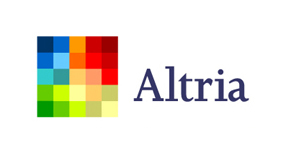
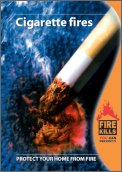 August 1, 2009 - David Sutton, spokesman of Philip Morris USA commented on Arizona, as of August 1, 2009, selling only fire-safe cigarettes.
August 1, 2009 - David Sutton, spokesman of Philip Morris USA commented on Arizona, as of August 1, 2009, selling only fire-safe cigarettes.
Sutton stated, The company prefers a national uniform standard. We are making a concerted effort to all of our national production by the first half of 2010."
In a previous news brief: R.J. Reynolds Tobacco with around 30% of the cigarette market, will start making all of its cigarettes fire-safe by the end of 2009. Liggett Group (with around two percent of the domestic market), announced on March 25, 2008 that it will convert all of its domestic (US) cigarette production standards to meet all state fire safety standards by January 2009. If Philip Morris, with over 50 percent of the domestic cigarette market would agree to start making all of its cigarettes fire-safe all other cigarette makers like Lorillard (with around 10 percent of the cigarette market) would join in. Lives could be lost - Philip Morris refuses to set date to convert to fire-safe cigarettes..
Just think: by the first half of 2010 then every state in the union would only sell fire-safe cigarettes.
News on fire-safe cigarettes..
Some related news briefs: Arizona only fire-safe cigarettes sold starting August 1, 2009..; Indiana - fire-safe cigarettes - July 1, 2009..; Lives could be lost - Philip Morris refuses to set date to convert to fire-safe cigarettes..; http://snus-news.blogspot.com/2009/02/australia-wants-to-move-up-date-to-have.html; Australia - Victoria fires - arson thrown cigarette butt..; U.S.A. Fire-Safe Cigarettes for All 50 States - NOW..; USA States Self-extinguishing Cigarettes Becoming the Norm..; Dummies - Citizens Against Fire Safe Cigarettes..; Cigarettes “fire safe” in Minnesota as of December 1, 2008..; Fire - Safe Cigarettes for all 50 states - NOW.. and Switzerland could join EU requiring sale of only self-extinguishing cigarettes..
Read more...
Arizona only fire-safe cigarettes sold starting August 1, 2009...

August 1, 2009 - A new Arizona law requiring all cigarettes sold in the state to be "fire-safe" goes into effect Saturday, August 1, 2009. The law was signed May 6, 2008, and requires all retail locations to sell only fire safe cigarettes (FSC) to consumers.
If a smoker does not puff on the cigarette for an extended amount of time, the cigarette is less likely to stay lit and more likely to self-extinguish.
According to officials, the new cigarette will reduce the risk of accidentally igniting fires, which, according to the Yuma Fire Department (YFD), is the leading cause of fire-related deaths in the United States.
"In 2006, which was the most recent year we have information on, there were 142,900 smoking material fires in the United States that caused 780 deaths and 1,600 injuries," said Mike Erfert, YFD public information officer. He said firefighters commonly respond to such fires in the Yuma area.
"The state of New York, which was the first to adopt such a law, has shown a reduction in smoking material deaths. If they are not being smoked, they go out, and that should reduce smoking material fires. The most common items first ignited in such fires are upholstered furniture, mattresses and bedding.
"If somebody falls asleep, pretty soon their couch or bed can start burning, and that is why folks should never smoke in bed."
Fire-safe cigarettes.. Erfert said while the new cigarettes may be safer, they should still be handled with extreme care. "If they work as claimed and go out when not being smoked, it should have an effect on smoking material fires; and since such fires are the leading cause of fire deaths, it should reduce those as well. "The big thing is that although they are called fire safe cigarettes, people need to still take precautions. They are still a potential ignition source."
David Sutton, spokesman of Phillip Morris USA, said even though the new design has a reduced cigarette ignition propensity (RCIP), smokers cannot act carelessly. "In terms of the testing that has been done, it has shown they do have propensity to extinguish, but just like traditional cigarettes, they can still cause a fire, and should be handled and disposed of properly."
Sutton said the new cigarettes don't look any different from traditional cigarettes.
"The cigarette does not look or feel any different. If you put a traditional cigarette right next to a paper safe cigarette, you can't tell the difference. The paper is exactly the same except for the banding technology. There are no new chemicals and it is the same tobacco blend."
Sutton said 49 states have passed legislation requiring fire safe cigarettes, even though there is no federal law requiring such product enhancements.
"The company prefers a national uniform standard. We are making a concerted effort to [expand FSCs to] all of our national production by the first half of 2010." According to Phillip Morris, because banded paper makes cigarettes more likely to self-extinguish during normal smoking, some adult smokers have reported annoyance if their cigarette extinguishes unexpectedly. "Consumers smoke in different ways, so it is an individual smoking experience. After a few months the consumers get used to the new paper and they way they smoke," Sutton said.
Some smokers are unhappy with the change, and want the law to be repealed. The Citizens Against Fire Safe Cigarettes (CAFSC), an organization which is collecting signatures for an appeal, claims the new cigarettes have an adverse effect on smokers' health. According to the CAFSC, FSC cigarettes "require that a smoker inhale in less than one minute or the cigarette will extinguish itself. The need to keep a FSC cigarette burning increases the number of inhales per cigarette, and thus increases the amount of tar, nicotine and carbon monoxide intake into the smoker's lungs."
The CAFSC said the new law will hurt more people than it helps. "Safe smoking habits of responsible adults prevent fatalities from burning cigarettes. It is up to individuals to responsibly extinguish cigarettes. The creation of FSC cigarette has created numerous hazards which cause more fatalities and problems than the small amount of lives saved from fires with the FSC cigarettes in use. "Not only are the FSC cigarettes unsafe to smokers, it presents health problems and increases the damage of cigarettes. Due to inadequate testing by cigarette companies and government agencies, the FSC cigarette poses real and identified dangers to the smoking public."
Reference: New cigarette law goes into effect Saturday bY CHRIS McDANIEL, YumanSun.com, 7/31/2009.
Some related news briefs: Indiana - fire-safe cigarettes - July 1, 2009..; Lives could be lost - Philip Morris refuses to set date to convert to fire-safe cigarettes..; http://snus-news.blogspot.com/2009/02/australia-wants-to-move-up-date-to-have.html; Australia - Victoria fires - arson thrown cigarette butt..; U.S.A. Fire-Safe Cigarettes for All 50 States - NOW..; USA States Self-extinguishing Cigarettes Becoming the Norm..; Dummies - Citizens Against Fire Safe Cigarettes..; Cigarettes “fire safe” in Minnesota as of December 1, 2008..; Fire - Safe Cigarettes for all 50 states - NOW.. and Switzerland could join EU requiring sale of only self-extinguishing cigarettes..
Read more...
Denmark - veggie price increases triple that of cigarettes..
 July 31, 2009 - The state has allowed the cost of cigarettes to stagnate while vegetable prices have soared. Over the past 30 years the price of vegetables has risen three times as much as that of a pack of cigarettes, according to figures from Statistics Denmark.
July 31, 2009 - The state has allowed the cost of cigarettes to stagnate while vegetable prices have soared. Over the past 30 years the price of vegetables has risen three times as much as that of a pack of cigarettes, according to figures from Statistics Denmark.
Cigarettes cost 136.4 percent more now than they did in 1979, while prices on vegetables on average have jumped 383 percent since then. If cigarette prices had risen at the same pace as veggies, a pack would now cost around 90 kroner (17.34USD). But the government, under new prime minister, Lars Løkke Rasmussen, recently indicated it would not implement a proposal to raise the price of fags to 50 kroner (9.58USD)a pack.
Instead, the government will add three kroner (0.58USD) to the cost, making the average price of a pack around 36 kroner (6.89USD).
Jes Søgaard, head of the Danish Institute for Health Services Research, called the development ‘an anomaly’. ‘There’s basically a price elasticity between -0.4 and -0.8 percent for goods such as alcohol and tobacco,’ he said. ‘In actuality that means when prices are increased by 10 percent purchases fall by around 5 percent.’ Søgaard said that, in particular, taxes on luxury items have not kept up with other cost increases.
According to statistics, the overall retail price index has increased by 200.7 percent since 1979.
Tobacco in Denmark..
Reference: Veggie price increases triple that of smokes, The Copenhagen Post Online, 4/29?2009.
Read more...
Sri Lanka - huge drop in tobacco smoking..
 July 31, 2009 - Sri Lanka banned smoking in public places with beginning Friday, December 1, 2006. Offenders would have to pay a 5000 rupee (43.53USD) fine under the Tobacco and Alcohol Act which was recently passed in the parliament. Selling tobacco products to anyone under 21 years of age will also be an offense. Hotels and restaurants also will have to allocate separate areas for smoking. According to the Act a hotel that have more than thirty rooms and cafes that have space for more than thirty persons can have such places. However there should be adequate ventilation. (The Tobacco and Alcohol Act effective next month, Official Government News Portal for Sri Lanka, 11/16/2006.
July 31, 2009 - Sri Lanka banned smoking in public places with beginning Friday, December 1, 2006. Offenders would have to pay a 5000 rupee (43.53USD) fine under the Tobacco and Alcohol Act which was recently passed in the parliament. Selling tobacco products to anyone under 21 years of age will also be an offense. Hotels and restaurants also will have to allocate separate areas for smoking. According to the Act a hotel that have more than thirty rooms and cafes that have space for more than thirty persons can have such places. However there should be adequate ventilation. (The Tobacco and Alcohol Act effective next month, Official Government News Portal for Sri Lanka, 11/16/2006.
National Authority on Tobacco and Alcohol...
Sri Lanka has seen a huge drop in tobacco smoking since the introduction in 2005 of a number of anti-tobacco policies, according to a story in the Daily News quoting the chairman of the National Authority on Tobacco and Alcohol (NATA), Prof. Carlo Fonseka.
Tobacco consumption, which in 1997 stood at 13 per cent, now stood at five per cent, Fonseka said, while tobacco consumption among school children had dropped from five per cent to 0.9 per cent.
 President Mahinda Rajapaksa, Fonseka said, was the first national leader to include anti-alcohol, anti-tobacco and anti-drug policies as a high national priority. Tobacco, alcohol and drugs would be eradicated with stringent measures, he added.
President Mahinda Rajapaksa, Fonseka said, was the first national leader to include anti-alcohol, anti-tobacco and anti-drug policies as a high national priority. Tobacco, alcohol and drugs would be eradicated with stringent measures, he added.
At the same time, NATA co-ordinator, Dr. Prasanna Cooray, said the cultivation of tobacco in the north and east would be discouraged because it caused destruction of the soil and destruction of the farming community.
Instead, farmers would be encouraged to grow maize and other food crops.
Nevertheless, the Ceylon Tobacco Company (CTC), a British American Tobacco (BAT) unit, contributed Rs25.5 billion towards the government’s revenue during the first half of this year, Rs1.7 billion, or 7.1 per cent, more than it contributed during the first half of 2008, according to a report in the Daily Mirror.
This was despite a reported decline in sales volume caused by higher, excise-led price increases and lower consumer affordability.
Sri Lanka was the first country in Asia to ratify WHO's Framework Convention on Tobacco Control FCTC Treaty.
Reference: War on drugs, alcohol, Sri Lanka's Daily News, 7/30/2009.
Read more...
Russia - making it more difficult for servicemen to smoke..
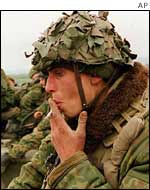
July 31, 2009 - Russia will no longer include free cigarettes in its food rations for servicemen but will compensate by providing them with candy, a top general said Thursday.
"We are no longer buying cigarettes for the armed forces and are replacing them with caramel and sugar," Lieutenant-General Dmitry Bulgakov was quoted by news agencies as saying.
Bulgakov specified however that Russia was not banning smoking in the military. "Naturally, if a soldier wants to smoke we can't forbid this. But now he'll have to buy cigarettes in stores," Bulgakov said. "If you want to smoke, then smoke. If you don't want to smoke, eat candy."
If you follow 1,000 people who have smoked regularly from when they were young, then 500 will die from tobacco. The link between smoking and death are dose-related. The more you smoke, the greater the risk of damage.
Bulgakov also announced defense ministry plans to provide military officers who work mainly indoors or in hot climates with new uniforms, including socks that let feet "breathe" and shoes "of high-quality leather." However, after being issued a complete uniform kit at the start of service officers will afterwards have to purchase new uniform components themselves, albeit from special military stores open only to officers and their families. The decision to introduce updated, higher-quality uniforms to Russian military personnel was made in 2007, which were scheduled to be issued this year. However, while a few units have received new uniforms -- notably those that marched on the May 9 Victory Day parade on Red Square -- the project has been delayed due to defense ministry budget cuts. Defense chiefs now planned to phase in the new uniforms over the next two to three years, Bulgakov said.
Reference: Russian army rations to swap cigarettes for candy: general, Agence France Presse (AFP), 7/31/2009.
Related news briefs: U.S soldiers. - video game-based educational program to battle rising tobacco use..; U.S. Military - phased in ban on smoking..; U.S. Department of Defense is endorsing the observance of World No Tobacco Day...
Read more...
Denmark - smokers being marginalized more and more..
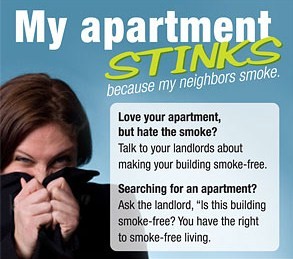 July 31, 2009 - Second-hand smoke (secondhand, passive smoking, involuntary smoke, sidestream smoke, environmental tobacco smoke, ETS) seeping through walls has many housing associations considering creating smoke-free flats.
July 31, 2009 - Second-hand smoke (secondhand, passive smoking, involuntary smoke, sidestream smoke, environmental tobacco smoke, ETS) seeping through walls has many housing associations considering creating smoke-free flats.
An increasing number of complaints by tenants over cigarette smoke from adjoining flats have resulted in housing companies considering how they can establish smoke-free complexes.
KAB, the country’s largest administrator of non-profit housing, already presented the idea back in December, and now Fredensborg Housing Association has put forth a fully completed plan for several non-smoking housing blocks.
However, implementing the no-smoking policy could face many obstacles – not least that associations may not discriminate against smokers.
The idea is popular in the US, where privately-owned flat complexes are common and smoking rules can be legally upheld. But most flats in Denmark are rented out through non-profit building associations via waiting lists, where people typically wait years before being offered a flat.
And in a time where availability is at an all-time high, most owners are pressed just to get their properties rented out. In addition, construction of new apartments has ground to a halt due to the low demand.
‘As it is today, we don’t have a law where we can refuse to rent to someone who won’t sign a statement saying they are a non-smoker,’ Finn Christensen, chairman of Fredensborg Housing Association’s board, told Politiken newspaper.
‘A totally smoke-free environment is entirely contingent on the tenants’ goodwill. And you can’t throw someone out because they’ve been smoking. So to implement an effective smoke-free environment there really has to be a law change,’ said Christensen.
Scientists at Aalborg University are conversely taking a back-door approach to the issue, working on developing better insulation for walls that can block the passage of cigarette fumes and odours from seeping into neighbouring flats.
The Danish Cancer Society indicates that children in particular are at risk of being harmed by passive smoke, even in relatively small doses from adjoining flats.
Reference" Smoke-free flats considered,The Copenhagern Post Online, 7/28/2009.
Tuesday, 28 July 2009.
Secondhand smoke is deadly. “There is no risk-free level of exposure to secondhand smoke. Breathing even a little secondhand smoke can be harmful. The only way to fully protect yourself and your loved ones from the dangers of secondhand smoke is through 100% smoke-free environments.” Surgeon General’s Report on Secondhand Smoke, issued June 27, 2006.
Secondhand smoke cannot be controlled by ventilation or air cleaning: On June 30, 2005, the American Society of Heating, Refrigerating & Air-Conditioning Engineers (ASHRAE) issued their latest position document on secondhand smoke. It states: “At present, the only means of effectively eliminating health risk associated with indoor exposure is to ban smoking activity.” www.ashrae.org.
Click on image to enlarge..
Read more...
Japan Tobacco International - Business Results for January – June 2009..
 July 30, 2009 - Tokyo, July 30, 2009 -- Japan Tobacco Inc. (JT) (TSE: 2914) today announced its international tobacco business results for the six-month period from January 1, 2009 to June 30, 2009.
July 30, 2009 - Tokyo, July 30, 2009 -- Japan Tobacco Inc. (JT) (TSE: 2914) today announced its international tobacco business results for the six-month period from January 1, 2009 to June 30, 2009.
International Tobacco Business - Net sales excluding tax and EBITDA (earnings before interest, taxes, depreeciation and amortization) declined 21.0 percent and 28.3 percent, respectively in comparison to the same period last year, primarily because of the currency impacts. Net sales excluding tax and EBITDA each grew 7.9 percent and 7.1 percent, respectively, at constant rates of exchange. Although the total sales volume decreased 1.4 percent, GFB sales volume increased 2.6 percent. Sales volume growth was largely attributed to the continued momentum in Russia, the United Kingdom and lead European markets, which were offset by a planned change in the business model in the Philippines and shipment issues in the Near East. While the company will continue to closely monitor currency fluctuations and economic downturns, it remains committed to achieving the forecasted EBITDA for the fiscal year ending March 31, 2010, through a combination of price increases and cost optimization.
In the first half that ended June 30, 2009, the sales volume of JTI's business operations, decreased by 0.9 percent to 216.1 billion cigarettes1 compared to the same period last year. Meanwhile, Global Flagship Brands (GFB2) continued to act as the key contributor to JTI’s performance.
Global Flagship Brands - sales volume increased 1.8 percent to 121.3 billion cigarettes in relation to the same period last year. Total sales volume for Winston went down slightly by 0.5 percent, with growth in Turkey, Italy and France, which was offset by declines in the Philippines due to a planned change in business model, substantial rises in excise tax in Ukraine which triggered price increases, and an unstable business environment in the Near East.
Mild Seven’s sales volume went up 3.2 percent with growth mainly in Korea. Camel sales volume decreased by 2.0 percent with a good performance in Italy being offset by decreases in Latin America and the Philippines. Total sales volume for LD grew by 22.1 percent, reflecting the state of the current economy, mainly due to solid performances in Russia, Ukraine, Poland and Turkey.
1 Total sales volume includes cigars, pipe tobacco and snus, but does not include private label and contract manufacturing products.
2 Global Flagship Brands consist of eight brands: Winston, Camel, Mild Seven, Benson & Hedges, Silk Cut, LD, Sobranie and Glamour.
Domestic Tobacco Business Sales volume decreased 7.2 percent in comparison to the same period last year to 39.0 billion cigarettes, largely due to the last year’s trade inventory adjustments related to the introduction of the “taspo” age verification vending machines, which took place between March and July 2008.
Excluding this effect, our volume decline of 4.2 percent was in line with our plan assumptions. In the meantime, JT’s share of market has been performing robustly at 65.1 percent, thanks to sales promotions aimed at securing product visibility and new product launches around its key brands
JT Reports International Tobacco Business Results for January – June 2009; JT has Embarked on a Solid Start to Achieving its Fiscal Year Outlook Ending March 31, 2010, Japan Tonacco Inc., 6/30/2009.
Read more...
Imperial Tobacco sales for year ending June 2009..
 July 30, 2009 - Imperial Tobacco has attributed a fall in tobacco sales in the UK and the rest of the European Union (EU) for the year ending June 2009 to a reduction in foreign travel and lower duty-free sales. Despite the decline, the company said sales for the financial year ending September 2009 remain in line with expectations.
July 30, 2009 - Imperial Tobacco has attributed a fall in tobacco sales in the UK and the rest of the European Union (EU) for the year ending June 2009 to a reduction in foreign travel and lower duty-free sales. Despite the decline, the company said sales for the financial year ending September 2009 remain in line with expectations.
Cigarette sales in Spain were down by about 4% in the 12 months to June 2009 year on year owing to a decline in airport sales and Spanish smokers trading down to ryo (roll-your-own) tobacco. In the UK (United Kingdom, Great Britain), the annual duty-paid cigarette market declined by about 1% during the same period owing to fewer purchases of UK brands abroad because of a decline in overseas travel, and a weaker economy and currency. But the UK fine-cut tobacco market grew as more smokers decided to roll their own cigarettes. In the rest of the EU regional market, sales volumes were down by 5% in the year to June 2009 as a result of duty increases in Poland and the Czech Republic.
In the rest of the world, the company continued to increase sales volumes and market share . Davidoff volumes increased by 21%, with Gauloises sales up by 10%, Gitanes by 33% and Fine by 25% in the nine months to June 2009. Sales in the US for the three months to June 30 2009 have dropped by 10% year on year owing to a significant increase in federal excise taxes on all tobacco products.
Imperial Tobacco CEO Gareth Davies said: “We have delivered another good performance in our third quarter, driving sales throughout our enlarged geographic footprint and achieving further volume and share growth across our regions. The versatility of our balanced portfolio is enabling us to benefit from growth in value cigarette and fine cut tobacco brands in mature markets, while continuing to develop our mainstream and premium cigarette brands in emerging markets.
“Despite the challenges of the wider operating environment, we anticipate another successful year, with the Altadis integration progressing well and our cash conversion expected to exceed 100%,” he concluded.
Reference: Imperial Tobacco sales down in EU as air travel declines, Andrew Pentol, DFNIonline.com, 7/23/2009.
Read more...
BAT - continues growth in 1st half of 2009..
 July 30, 2009 - LONDON -- British American Tobacco (BAT) PLC reported Thursday, July 30th that its first half profit rose 16 percent from a year earlier to 1.45 billion pounds ($2.38 billion) as top brands such as Lucky Strike showed better sales.
July 30, 2009 - LONDON -- British American Tobacco (BAT) PLC reported Thursday, July 30th that its first half profit rose 16 percent from a year earlier to 1.45 billion pounds ($2.38 billion) as top brands such as Lucky Strike showed better sales.
Revenue was up 24 percent to 6.78 billion pounds, a 14 percent gain on a constant currency basis, boosted by last year's acquisitions of Skandinavisk Tobakscompagni of Denmark and Tekel of Turkey.
Group volumes rose 5 per cent; however, excluding acquisitions volumes declined 2 percent, mainly due to falling sales in Russia, Ukraine, Japan and Mexico.
The company reported good volume growth in Pakistan, Bangladesh, South Korea, Uzbekistan, Nigeria and the Gulf Cooperation Council.
Volume of premium brands was down 1 percent excluding acquisitions.
The company raised its interim dividend by 26 percent to 27.9 pence.
BAT's four "global drive brands" grew by 5 percent, with Dunhill up 8 percent, Lucky Strike up 7 percent and Pall Mall up 10 percent. Kent was 2 percent lower.
BAT has continued to grow, acquiring Tbk (Bentoel), Indonesia's fourth-largest cigarette maker, in June for 303 million pounds.
Reference: British American Tobacco H1 profit up 16 pct, Associated Press _ Miami Herald, 7/30/2009.
Read more...
Tobacco Control Legal Consortium - facts sheets provided to help understand the "Family Smoking Prevention and Tobacco Control Act"...

July 30, 2009 - On June 22, 2009, President Barack Obama signed into law the Family Smoking Prevention and Tobacco Control Act, giving the U.S. Food and Drug Administration (FDA) comprehensive authority to regulate the manufacturing, marketing, and sale of tobacco products. The new law represents the most sweeping action taken to date to reduce what remains the leading preventable cause of death in the United States.
To help you understand and evaluate this complex legislation, the Tobacco Control Legal Consortium ("Improving Health Through the Power of Law") has prepared two series of fact sheets. In the coming months, the Consortium will be developing additional materials to address legal issues raised by the new legislation and to help state and local advocates and policymakers take full advantage of the new opportunities it creates.
Federal Regulation of Tobacco: A Summary - Our first series of fact sheets summarizes by topic key elements of the new law and Federal Regulation of Tobacco: Impact on State and Local Authority - Our second series of fact sheets describes how the new federal legislation will affect the tobacco control authority of state and local governments.
Read more...
Oregon - electronic (e) cigarettes sales prohibited until approved by FDA..
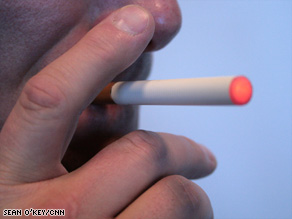 July 30, 2009 - Oregon Department of Justice (Senior Assistant Attorney General David Hart handled the case for the Department of Justice) filed two settlements Thursday, July 30th that prevent two national travel store chains from selling "electronic cigarettes" in Oregon. The action is the first of its kind in the country and prevents Oregonians from buying potentially dangerous products that the U.S. Food and Drug Administration has yet to approve.
July 30, 2009 - Oregon Department of Justice (Senior Assistant Attorney General David Hart handled the case for the Department of Justice) filed two settlements Thursday, July 30th that prevent two national travel store chains from selling "electronic cigarettes" in Oregon. The action is the first of its kind in the country and prevents Oregonians from buying potentially dangerous products that the U.S. Food and Drug Administration has yet to approve.
"When products threaten the health and safety of Oregonians, we will take action," said Mary Williams, deputy attorney general. "If companies want to sell electronic cigarettes to consumers, they have to be able to prove they are safe."
The affected travel store chains, Pilot Travel Centers, which has seven centers in Oregon, and TA Operating, which has four centers in Oregon, both sell "NJOY" brand electronic cigarettes.
Electronic cigarettes are actually battery operated nicotine delivery devices constructed to mimic conventional cigarette. Each "cigarette" consists of a heating element and a replaceable plastic cartridge that contains various chemicals, including various concentrations of liquid nicotine. The heating element vaporizes the liquid, which the user inhales as if it were smoke.
Despite FDA issued "Import Alerts" against NJOY and other brands of electronic cigarettes, and despite the fact that the U.S. Customs Service detained several shipments of these devices, sales of electronic cigarettes continue throughout the United States.
Sales persisted even though just last week the FDA warned the public about health concerns regarding electronic cigarettes. FDA tests showed a wide variation in the amount of nicotine delivered by three different samples of nicotine cartridges with the same label. Tests also revealed the presence of nitrosamines - a known carcinogen.
By the time the FDA issued its warnings, the Oregon Department of Justice had already launched an active investigation of the sale and promotion of electronic cigarettes. NJOY electronic cigarettes were a target of that investigation.
Consumer protection has long been a priority for the Oregon Department of Justice. In recent years, the Attorney General's office has been the lead voice in the ongoing litigation against tobacco companies. As a result of their work, hundreds of millions of dollars have poured back into the state to subsidize health costs related to the now known hazards of smoking. The Oregon Department of Justice continues to enforce the tobacco Master Settlement Agreement on behalf of the state.
The settlement announced Thursday, July 30th prohibits the sale of electronic cigarettes in Oregon until they are approved by FDA, or until a court rules the FDA does not have the authority to regulate electronic cigarettes.
Even if courts decide that the FDA does not have regulation authority, the settlement stipulates that electronic cigarettes may not be sold in Oregon unless there is competent and reliable scientific evidence to support the product's safety claims.
In addition, the companies must give the Attorney General advance notice that they intend to sell electronic cigarettes in Oregon, provide copies of all electronic cigarette advertising, and provide copies of the scientific studies they maintain substantiates their claims.
Reference: Oregon AG moves to block 'E-cigarette' sales, KTVZ.com, 7/30/2009.
A few related news briefs: Israel bans electronic (e) cigarettes..; New Zealand - 1st trial ever of e-cigarettes..; Another e-cigarette..; Denmark - e-cigarettes can not be sold OTC..; E-cigarettes need to establish efficacy and safety - FIRST..; Health Canada warns against 'e-cigarettes'..
Read more...
Philip Morris USA production plant in Cabarrus County, North Carolina closed..
 July 30, 2009 - As of this morning, Philip Morris USA's Richmond manufacturing plant is the only site where the company makes cigarettes. The last cigarettes -- specifically, Marlboros -- came off the production line at its Cabarrus County, N.C., manufacturing plant at about 9 last night.
July 30, 2009 - As of this morning, Philip Morris USA's Richmond manufacturing plant is the only site where the company makes cigarettes. The last cigarettes -- specifically, Marlboros -- came off the production line at its Cabarrus County, N.C., manufacturing plant at about 9 last night.
About 1,000 employees were working their last shifts at the plant near Charlotte yesterday. An additional 100 employees will continue to work there as the plant is decommissioned, which could take until late this year or early next year.
In June 2007, Philip Morris USA said it would close the North Carolina plant and move its production to Richmond in 2010. The decision came as its parent company, Altria Group Inc., made plans to spin off its international cigarette subsidiary as a separate company. The spinoff, completed last year, eliminated the export market for the company's U.S. cigarette factories, which now supply only the slowly declining domestic market.
The company said 565 employees at the North Carolina plant accepted transfers to Richmond, and nearly all of them already have moved.
Altria said it had about 2,300 employees at its Richmond cigarette plant at the start of this year and about 5,400 overall in the Richmond area, but the company also acknowledged making significant job cuts from its local operations this year as it adjusts to a smaller cigarette market. The company has not confirmed a specific number of job cuts.
In May, the company said it would close the North Carolina plant by the end of July, months earlier than it had first announced, in part because of the ongoing erosion in cigarette shipments. The North Carolina plant, on U.S. 29 in Concord, about 20 miles northeast of Charlotte, opened in 1982. At its peak production, it manufactured 155 billion cigarettes a year and employed 2,500 people. Its production volume was typically higher than the Richmond plant's, in part because the Cabarrus site had "super high speed" machinery that could produce 1,000 packs per minute, compared with 700 packs by machines used in Richmond, said Paige Magness, a company spokeswoman.
The North Carolina plant, on U.S. 29 in Concord, about 20 miles northeast of Charlotte, opened in 1982. At its peak production, it manufactured 155 billion cigarettes a year and employed 2,500 people. Its production volume was typically higher than the Richmond plant's, in part because the Cabarrus site had "super high speed" machinery that could produce 1,000 packs per minute, compared with 700 packs by machines used in Richmond, said Paige Magness, a company spokeswoman.
The faster machines are being moved to the Richmond plant, which is undergoing renovations. New tobacco-processing equipment is being installed; the basic infrastructure is being upgraded; and office areas, the fitness center and the cafeteria are being remodeled, Magness said.
The 2.5 million-square-foot North Carolina plant has been put up for sale, along with about 1 million square feet of distribution space and 1,500 acres of developable land around the plant. Magness said she could not comment on prospective buyers. "The site is actively being marketed," she said. "We have certainly had a number of interested parties along the way."
Reference: Production ends at Philip Morris USA’s N.C. plant, JOHN REID BLACKWELL Richmond Times-Dispatch Staff Writer, 7/30/2009.
Related news briefs: Philip Morris Concord NC plants to close one year early..; Philip Morris (PM) to close N.C. cigarette plant..; Philip Morris (PM) to close N.C. cigarette plant...
Click on image to enlarge; Tombstone should read 1978 - 2009 not 2010..
Read more...
Turkey - smoker wounds manager and kills his friend when asked to stop smoking..
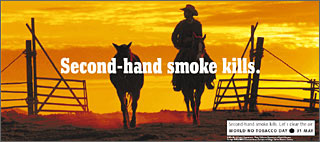 July 30, 2009 - A smoker shot one man dead and wounded another after he was told to stub out his cigarette at a restaurant in Turkey in line with a recent government ban, the Anatolia news agency reported on Wednesday.
July 30, 2009 - A smoker shot one man dead and wounded another after he was told to stub out his cigarette at a restaurant in Turkey in line with a recent government ban, the Anatolia news agency reported on Wednesday.
The gunman was drinking and smoking with friends in a restaurant in the town of Kumkuyucak, in the western province of Manisa, when the manager and his friend told them to put out their cigarettes, mayor Veli Yalcin told the agency.
In the ensuing fight, the assailant fired his gun, wounding the manager and killing his 46-year-old friend, who was an accountant at the local municipality, the mayor said. Police launched a manhunt to catch the assailant.
Turkey introduced a ban on smoking in bars, cafes and restaurants on July 19, stipulating fines for both smokers and establishments for violations.
(Back in February 2009 a Sudanese man has been sentenced to 30 lashes for smoking on a domestic Saudi Arabian Airlines flight..)
Reference: Smoking leads to murder, SAPA, News24.com, 7/29/2009.
Turkey - related news briefs:
Turkey - cafe owners complain about smoking ban..;
Turkey - dangers of secondhand smoke media campaign..;
Turkish Government - makes major move to improve the health of its citizens..;
Turkey - smoking ban starting July 19th will be enforced - these guys are serious..;
Turkey - poll indicates employers, their employees and customers support smoking ban in cafes, bars and restaurants..;
Turkey - July 19th total smoking ban, will employees lose jobs..;
Turkey - on July 19, 2009 will mark the beginning of “100 percent smoke-free air” in this country..;
Turkey - national smoking ban starts July 19, 2009..;
Turkey - quit smoking photo displayed in İstanbul's Taksim Square..;
Turkey - data on tobacco usage - Turkish Statistics Institution..;
Turkey - smoking ban in all bars, restaurants and coffeehouses starting July 19, 2009..;
Smoking ban in Turkey lowers cigarette consumption..; Turkey's ban on pubic smoking goes into effect on Monday, May 19, 2008..;
British American Tobacco (BAT) reported group volume sales up for first quarter 2008..; More on the quick fix for outdoor smokers..;
BAT to Acquire Most of Denmark's ST..;
More on Philip Morris International of the Future..;
WHO Report on the Global Tobacco Epidemic 2008...
Read more...
More on Camel Dip - a premium moist snuff..
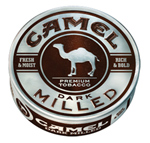 July 30, 2009 - Back in April 2009 Reynolds American Inc. (RAI) announced it will launch Camel Dip (moist snuff), a premium moist smokeless product, in test markets in Colorado and Florida beginning in mid-June, 2009. Camel Dip will be distributed through Reynolds' Conwood Co. subsidiary, making it the first time that the manufacturer (produced and packaged at Conwood's plant in Memphis, Tenn., as well as distributed by the Memphis-based company) has marketed a Camel product outside R.J. Reynolds Tobacco Co.(RJR). (Camel SNUS is marketed by RJR.)
July 30, 2009 - Back in April 2009 Reynolds American Inc. (RAI) announced it will launch Camel Dip (moist snuff), a premium moist smokeless product, in test markets in Colorado and Florida beginning in mid-June, 2009. Camel Dip will be distributed through Reynolds' Conwood Co. subsidiary, making it the first time that the manufacturer (produced and packaged at Conwood's plant in Memphis, Tenn., as well as distributed by the Memphis-based company) has marketed a Camel product outside R.J. Reynolds Tobacco Co.(RJR). (Camel SNUS is marketed by RJR.)
Camel Dip snuff is being offered to distributors for the same price its bigger competitor charges for Skoal and Copenhagen, said Bryan Stockdale, chief executive officer of Reynolds’ Conwood unit. A national expansion of Camel Dip may help the company reverse declining market share in higher-priced snuff, he said.
RAI CEO comments on the launch of Camel Dip and Camel SNUS market..
Reynolds and Altria, the country’s two largest tobacco companies, are going after the snuff market to counter shrinking cigarette demand. Altria’s UST division cut the price of Skoal and Copenhagen 62 cents per can on March 29, spurring Reynolds to lower prices (on April 1st 72 cents) of its more-expensive Kodiak brand in a move that hurt second- quarter profit. Camel’s share of U.S. smokers was unchanged at 7.5 percent in the period, the Winston-Salem, North Carolina- based company said July 23.
The price reductions on those two brands haven’t slowed Grizzly’s growth, Stockdale said. Reynolds has introduced four new varieties of Grizzly (Grizzly pouches (2-pouch styles, mint and straight, launched in the 1st quarter 2009 only accounted for 0.2 of a share point.)
“We’re stretching the brand to figure out whether or not you can take a well-known cigarette trademark and expand it into this category,” Stockdale, 51, said July 27 in his first interview since taking charge of Conwood in February. “There’s a whole lot of early-on feedback that says we may have something that’s got some legs to it.”
Will the Camel trademark succeed where the Marlboro trademark failed..
Altria won’t comment on Camel Dip, David Sylvia, a spokesman for the Richmond, Virginia-based company, said in an e-mail. Grizzly and Kodiak are Reynolds’ top-selling smokeless tobacco brands. (Grizzly (value priced) is the nations number one moist snuff brand and has expanded its market share to 25.5 percent; Kodiak is a very slow moving product) It also makes tobacco twists, Levi Garrett chewing tobacco and Tube Rose snuff, according to Conwood’s Web site. Altria’s UST division sells Red Seal and Husky snuff in addition to Skoal and Copenhagen.
Grizzly and Kodiak are Reynolds’ top-selling smokeless tobacco brands. (Grizzly (value priced) is the nations number one moist snuff brand and has expanded its market share to 25.5 percent; Kodiak is a very slow moving product) It also makes tobacco twists, Levi Garrett chewing tobacco and Tube Rose snuff, according to Conwood’s Web site. Altria’s UST division sells Red Seal and Husky snuff in addition to Skoal and Copenhagen.
Reynolds is testing its Camel version of moist snuff as part of an effort to boost sales of higher-priced products. While the Kodiak brand generates lower sales than less-expensive Grizzly, it’s about twice as profitable, Stockdale said.
Reference: Reynolds May Introduce Camel Snuff to Go After Altria (Update1) by Chris Burritt, Bloomberg.com, 7/27/2009.
The Camel Circle of products diagram has to be updated with the dissolvables and now with Camel Dip.
Camel Dip - related news briefs: Reynolds American Inc. Q2 2009 Earnings..; RAI CEO comments on the launch of Camel Dip and Camel SNUS market..; Reynolds American to launch Camel Dip in June 2009...
Read more...
Belfast, Northern Ireland - nine million counterfeit cigarettes seized..
 July 29, 2009 - More than nine million suspected
July 29, 2009 - More than nine million suspected counterfeit (illegal, illicit, contraband) cigarettes have been seized in freight containers at Belfast docks over the last 24 hours. About 3.5 million John Player Special cigarettes were found on Tuesday night, July 28th by the UK Border Agency concealed in two containers under a load of granite. On Wednesday morning, July 29th officers uncovered six million mixed-brand cigarettes in a trailer containing peppers. A man from County Armagh was arrested by Customs after the second find. The brands found in the second batch included Benson and Hedges and Marlboro. The cigarettes were in boxes hidden amongst a cover load of peppers.
The cigarettes have an estimated duty loss of almost £2m (2,000,000.00 GBP =
3,300,367.63 USD).
John Whiting, of HM Revenue and Customs (HMRC's purpose is to make sure that the money is available to fund the UK's public services): "Tobacco smuggling is not a victimless crime. "The huge profits reaped from the sales of illegal cigarettes are ploughed straight back into the criminal underworld, feeding activities like drug dealing and fraud. "Purchasing cheap cigarettes without the duty paid on them means trading with criminals, and undermining honest businesses."
Maggie Eyden, of the UK Border Agency in Northern Ireland said: "UK Border Agency and HMRC are committed to stamping out the problem of cigarette and tobacco smuggling. "This criminal activity undermines public health by creating a cheap and unregulated supply."
Reference: 9m cigarettes are seized at docks in Belfast, Northern Ireland, BBC News Channel, 7/29/2009.
Top image - Coat of Arms of Northern Ireland..
Read more...
Cigarette packaging is a key marketing strategy for promoting brand image..
 July 29, 2009 "Cigarette packaging is associated with false beliefs about the risks of cigarettes and obviously that's a problem," says David Hammond author of a paper on the subject that appeared in the Journal of Public Health.
July 29, 2009 "Cigarette packaging is associated with false beliefs about the risks of cigarettes and obviously that's a problem," says David Hammond author of a paper on the subject that appeared in the Journal of Public Health.
Traditionally, the primary function of a package was to simply contain and protect the product however, factors such as increased competition and clutter on the retail store shelf have meant that for most products, packaging must perform many sales tasks, such as attracting attention, describing the product, and helping to make the
sale. (cigarette pack graphics)
When it comes to choosing which cigarette to smoke it seems the prettier the package, the less lethal the product appears to those buying it. It was found cigarette packages in lighter colors, bearing words like "smooth" and "filter," have consumers convinced the product has fewer health risks.
"We probably shouldn't have packaging that confuses people about whether some brands are less harmful than others. That's essentially a lethal misperception," said Hammond, a professor of health studies at the University of Waterloo. His study - one in a series of papers on cigarette packaging - had more than 600 adults, smokers and non-smokers, rate a variety of fictitious cigarette packages.
Participants were asked to compare packages in pairs and say which they believed would taste smoother, deliver more tar and carry lower health risks. Eighty per cent of those surveyed said they believed the package labeled "smooth" would be less hazardous than the one labeled "regular." A lighter blue box was also thought to carry a lower health risk than a darker one, while about 75 per cent of respondents found a box with the picture of a charcoal filter likely to be less risky than one without the illustration.
The researchers are calling for an expansion of the list of words banned from cigarette packaging and they are also pushing for the implementation of plain standardized packaging for all brands. 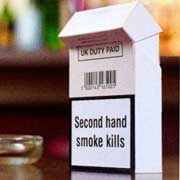 Plain packaging involves removing any brand imagery from a box so all packs look identical save for the brand name which would appear in a mandated size, font and position. The WHO's Framework Convention on Tobacco Control already states that countries should consider plain packaging.
Plain packaging involves removing any brand imagery from a box so all packs look identical save for the brand name which would appear in a mandated size, font and position. The WHO's Framework Convention on Tobacco Control already states that countries should consider plain packaging.
Health Canada, however, is not considering the concept at the moment, said spokeswoman Christelle Legault. Larger health messages and more health information could have a greater impact than plain packaging, said Legault. New ideas in tobacco control may be brought up as Canada's Federal Tobacco Strategy is renewed by 2011, she said.
As public health officials deliberate, tobacco industries say their phrasing is only to describe a cigarette's taste. But this is debatable, Hammond said. "Consumers are using it as indicators of risk," he said. "That helps reduce their guilt and (they) continue smoking."
While cigarette brands compete against one another with references to filters or statistics, Hammond said no brand trumps another with lower health risks.
Roberta Ferrence, executive director of the Ontario Tobacco Research Unit, said the study highlighted how existing regulations on packaging were not having the impact they were supposed to as people still consider some cigarettes less risky than others. "It's misleading advertising, there are no healthier cigarettes," she said, adding that certain phrasing and coloring on a package could encourage people to take up smoking.
Variations in cigarette packaging also target different kinds of smokers, said Veda Peters, tobacco education co-ordinator with the Canadian Lung Association. "People want to believe that there's a safe way to use the product and they want to buy into these descriptors." Plain packaging would allow cigarettes to be stripped of the wordy advertising that surrounds them, she said. "If you have generic packaging you see cigarettes for what they are - they're unimportant, they're dirty, they're smelly, they do nothing for you."
Ultimately, playing with colors and catchy phrasing on cigarette packages lies at the core of tobacco industry marketing, said Rob Cunningham, a senior policy analyst for the Canadian Cancer Society. "It's a mini billboard that walks around school yards, communities and inside homes," he said. "We need to have plain packaging."
PAPER: The impact of cigarette package design on perceptions of risk; David Hammond and Carla Parkinson; Journal of Public Health Advance Access published online on July 27, 2009; ABSTRACT; Full Text...
Reference: Snazzy cigarette packaging has consumers thinking the product is less lethal by Diana Mehta, The Canadian Press, 7/27/2009.
Click on image to enlarge; Marlboro Smooth launched in March 2007 with the tag line "Menthol like no other."
Read more...
Fewer Britons support the ban on smoking in pubs than in other public places..
 July 29, 2009 - While 93% agreed lighting up should not be allowed in restaurants, a smaller proportion of 75% believed it was right for cigarettes to be illegal in pubs. (United Kingdom, UK, Britain)
July 29, 2009 - While 93% agreed lighting up should not be allowed in restaurants, a smaller proportion of 75% believed it was right for cigarettes to be illegal in pubs. (United Kingdom, UK, Britain)
Smoke-free legislation was enforced across the UK by July 2007 (England - July 1, 2007, Scotland - March 26, 2006, Wales - April 2, 2007, Northern Ireland - April 30, 2007).
A survey carried out by the Office for National Statistics (ONS) since the ban showed the majority supported no smoking in the workplace (85%), indoor sports centres (94%), indoor shopping centres (91%) and railway and bus stations (85%).
Meanwhile, the proportion of smokers who said they would like to give up dropped to 67% in 2008-09 from 74% in 2007, although this was not significantly different to previous years, according to the ONS. Half of smokers intended to quit within the next year, the study found.
Health was the most common reason for people wanting to stop smoking, cited by 71%, while almost a third (31%) gave financial reasons.
The survey into smoking-related behaviour and attitudes, which covered the period September 2008 to March 2009, also revealed an awareness among smokers of the dangers of tobacco to children.
A total of 77% claimed they did not smoke at all when they were in a room with a child - a figure that has increased from the 54% recorded in 1997.
In terms of taxation, there was a clear divide between smokers and non-smokers, with 17% of smokers saying tax should be increased by more than the rate of inflation compared with 64% of those who had never smoked who supported inflation-plus rises on tobacco taxation.
Reference: Fewer Britons support the ban on smoking in pubs than in other public places, a survey has revealed, uk.news.yahoo.com, 7/28/2009.
Read more...
South Dakota - opponents of smoking ban gain a delay..
 July 29, 2009 - South Dakota's statewide ban on smoking is headed to a courtroom - probably within a month - as bar and gaming facility owners successfully won a stay Monday in Hughes County Circuit Court.
July 29, 2009 - South Dakota's statewide ban on smoking is headed to a courtroom - probably within a month - as bar and gaming facility owners successfully won a stay Monday in Hughes County Circuit Court.
The delay means smokers can continue to light up in bars, restaurants, Deadwood casinos and video gaming establishments. Ban opponents say the public should get to vote on the issue.
Circuit Judge Mark Barnett of Pierre on Monday, July 26th delayed enforcement of the smoking ban until the lawsuit is decided. The Legislature passed the law earlier this year to ban smoking in bars, Deadwood casinos and video lottery establishments.
Last Thursday, July 23rd Secretary of State Chris Nelson said 8,845 signatures on petitions to put the issue to a statewide vote were invalid. It meant the measure fell 221 signatures short of the number needed to put the issue on the November 2010 ballot. Ban supporters challenged almost 10,000 signatures.
But a decision in circuit court probably won't end the fight to enact the contentious legislation. "I would suspect that whoever loses will take the case on up to the Supreme Court," state Attorney General Larry Long said. "Judge Barnett will not be the last word on this."
Nelson discounted 2,552 signatures because of errors made by notaries. In many cases, the notaries failed to put a correct expiration date of their commissions on petitions they notarized, said Larry Mann, a spokesman for the smoking-ban coalition that includes Deadwood gaming, the Music and Vending Association, the Licensed Beverage Dealers of South Dakota and video lottery establishments. Mann said the coalition hopes the judge will rule that notary errors should not disqualify otherwise valid signatures.
Had the petition effort not taken place, the law would have gone into effect July 1.
APPLICATION FOR WRIT OF MANDAMUS STATE OF SOUTH DAKOTA CIRCUIT COURT HUGHES CO. (filed 7/27/2009) The South Dakota Supreme Court has held that an application for writ of mandamus (may be a command to do an administrative action or not to take a particular action), is the appropriate method of review of the Secretary of State's decision not to validate signatures on the petition sheets and to compel the Secretary to place referred measures on the election ballot.
Reference: Opponents of smoking ban gain a delay Attorney general predicts hearing within weeks after stay issued, THOM GABRUKIEWICZ • tgabrukiew@argusleader.com, ArgusLeader.com, 7/28/2009; Smoking ban fight heats up Petition backer says notaries in good standing by BOB MERCER, American News Correspondent, Aberdeen News, 7/29/2009.
Related news briefs: South Dakota - petition rejected - state smoking ban to take effect..; South Dakota - Secretary of State's Office still counting disputed signatures on the smoking ban petitions..; South Dakota - anti-smoking leaders challenge petition..; South Dakota - smoking ban to start July 1, 2009 may be delayed..; South Dakota - opponents try to stop extended smoking ban..; South Dakota - extends smoking ban effective July 1, 2009...
Published on Wednesday, July 29, 2009
Read more...
Wales council imposes blanket ban on smokers adopting or fostering children..


July 29, 2009 - A Merthyr Tydfil council (governing body for Merthyr Tydfil, one of the Principal Areas of Wales) has become the first in Wales to impose a blanket ban on smokers adopting or fostering children.
Anti-smoking campaigners last night welcomed the move by Merthyr Tydfil council, but critics have pointed out there are already not enough foster parents in Wales.
They fear the changes might discourage potential carers from coming forward and could jeopardize the future of children already in the care of smokers.
Increasing numbers of local authorities, including Cardiff and Pembrokeshire, have banned smokers from fostering children under five but this is the nation’s first blanket no-smoking rule for foster carers and adopters.
Roslyn Rees, head of operational children’s services at Merthyr Tydfil council, said: “The health, safety and well-being of children and young people are at the heart of policies and practice related to children. We acknowledge that expecting all foster carers who currently smoke to give up immediately is not realistic and that it would be detrimental to remove children from stable foster homes because their carer smokes.”
Anti-smoking campaign group Ash Wales said the move was a step in the right direction. A spokesman said: “Children who are exposed to second-hand smoke are at serious risk of pneumonia, bronchitis, headaches and ear infections. Exposure to second-hand smoke has also been linked to the development and worsening of asthma in children.
“Young children are particularly susceptible to the effects of second-hand smoke because their lungs and airways are small and their immune systems immature. Being exposed to second-hand smoke during childhood may also increase the chance of developing chronic constructive pulmonary disease (COPD) and cancer as adults.
“It is however vital that in addition to protecting children from exposure to tobacco smoke, that smokers themselves are supported to quit. In introducing this measure we would urge the local authority to ensure that foster careers are given help and advice on how to quit smoking and how to take the necessary steps to make their home smoke free.”
Other related: Study targets smoking in foster homes, Lynn Bonner - Staff Writer, Raliegh News & Observer, 6/4/2008; No Smoking for Pennsylvania Foster Parent.
Reference: Smokers banned by Welsh council from adopting or fostering children by Clare Hutchinson, Western Mail, WalesOnline.co.uk, 7/25/2009.
Read more...
Israel bans electronic (e) cigarettes..
 July 29, 2009 - The Health Ministry has banned electronic cigarettes, both the import and use of those previously brought into the country. The product is marketed as an aid to help smokers stop smoking.
July 29, 2009 - The Health Ministry has banned electronic cigarettes, both the import and use of those previously brought into the country. The product is marketed as an aid to help smokers stop smoking.
The move comes in the wake of a health warning by the U.S. Food and Drug Administration (FDA) about the product. The FDA did not ban their sale or use, however.
The Israeli Health Ministry decision, which came out Tuesday, July 28th covers both the import and sale of the product, including those that are marketed as nicotine-free.
E-cigarettes were previously approved the by ministry as medical devices to help people stop smoking. However, the ministry told importers to submit documentation proving the devices were safe for public use. The documentation required was to include an expert opinion from an Israeli toxicologist stating that all components of the product were safe to inhale and smoke.
U.S. research has found that the products are not safe at all.
The FDA issued its own warning after a research study examining 19 cigarettes found that half contained nitrosamines -- cancer-causing agents found in conventional cigarettes.
In addition, many also contained diethylene glycol, a poison found in the antifreeze liquid used in vehicles.
Some of the cigarettes that claimed not to contain any nicotine actually contained low levels of the addictive substance as well.
Most of the e-cigarettes, which came out on the market in 2004, are produced in China. They are sold all over the world, in various flavors, with and allegedly without nicotine.
The electronic cigarettes are battery-operated. Like regular cigarettes, smokers must inhale to enjoy their contents, and many include a burning chamber which resembles the taste of tobacco. In contrast to conventional cigarettes, the electronic cigarettes smoke without the odor that often disturbs non-smokers.
Reference: Health Ministry Bans Electronic Cigarettes by Hana Levi Julian and Avraham Zuroff, IsraelNationalNews.com, 7/29/2009.
A few related news briefs: New Zealand - 1st trial ever of e-cigarettes..; Another e-cigarette..; Denmark - e-cigarettes can not be sold OTC..; E-cigarettes need to establish efficacy and safety - FIRST..; Health Canada warns against 'e-cigarettes'..
Read more...
Pregnant women exposed to passive smoke greater chance of child will have respiratory distress..

 July 29, 2009 - Children born to women exposed to environmental tobacco smoke (ETS, passive smoking, involuntary smoking, sidestream smoke, secondhand smoke) during pregnancy face an increased risk for asthma symptoms in early life, researchers warn.
July 29, 2009 - Children born to women exposed to environmental tobacco smoke (ETS, passive smoking, involuntary smoking, sidestream smoke, secondhand smoke) during pregnancy face an increased risk for asthma symptoms in early life, researchers warn.
“Smoking during pregnancy has been shown to be a considerable risk factor for changes in growth and maturation of the fetal lungs and the later development of wheeze and asthma,” explain Paraskevi Xepapadaki (University of Athens, Greece) and team in the journal Pediatric Allergy and Immunology (see Abstract below).
But they add it is not known whether passive smoking in pregnancy is associated with an increased risk for asthma and allergies in offspring.
Paraskevi Xepapadaki : “This study demonstrates for the first time that passive exposure of non-smoking pregnant women to ETS may be associated with the development of allergy- and asthma-related symptoms in their children.
To investigate, the association of passive exposure of pregnant women to ETS and asthma- and/or allergy-related symptoms in Preschool children. Cross-sectional data were collected with questionnaires from 2374 Preschool children (aged 1 and 6 years), recruited from public and private nurseries and day-care centers from 115 nurseries in five counties of Greece.
The children’s parents completed questionnaires detailing demographic characteristics, current and past smoking habits, and pre- and postnatal exposure of mothers and children to ETS. They were also asked about their children’s history of wheeze and whether they had been diagnosed with asthma. Furthermore, any history of adverse reactions to foods and diagnoses of food allergies among the children was ascertained.
Analysis revealed that children born to mothers who actively smoked during pregnancy were 1.47 times more likely to have a history of wheezing, 1.66 times more likely to have doctor-diagnosed asthma, 1.38 times more likely to have suffered a pruritic rash in the last 12 months, and 1.16 times more likely to have doctor diagnosed atopic dermatitis than those born to a mother who did not smoke during pregnancy.
In multivariate analysis children born to non-smoking mothers who were regularly exposed to ETS during the third trimester of pregnancy were 1.42 times more likely to be current wheezers, 1.46 times more likely to have doctor-diagnosed asthma, and 1.45 times more likely to have suffered a pruritic rash in the last 12 months, than women without such exposure.
ETS exposure during other trimesters was not significantly associated with these outcomes.
Clinicians need to be aware of this risk factor and encourage pregnant women factor and encourage pregnant women to avoid such exposure not to smoke and avoid exposure to secondhand smoke.
PAPER: Association of passive exposure of pregnant women to environmental tobacco smoke with asthma symptoms in children (p 423-429); Paraskevi Xepapadaki, Yannis Manios, Theodoros Liarigkovinos, Evangelia Grammatikaki, Nikolaos Douladiris, Christine Kortsalioudaki, Nikolaos G. Papadopoulos; Pediatric Allergy and Immunology
Volume 20 Issue 5, Pages 423 - 429 (Published Online: 22 Jul 2009); ABSTRACT...
Reference: Passive smoking in pregnancy linked to asthma risk in children by Mark Cowen, MedWireNews, 7/24/2009.
A few related news briefs: Kids apt to smoke if mom did while pregnant..; Tobacco a threat to pregnant women and children in developing world...
Read more...
Australia - NSW - young women binge smoking..
 July 29, 2009 - Young women are behind an alarming new trend labeled "binge smoking" which is causing grave concerns for health experts. Similar to binge drinking, the practice involves the consumption of a large number of cigarettes over the course of a few hours, then not smoking for days.
July 29, 2009 - Young women are behind an alarming new trend labeled "binge smoking" which is causing grave concerns for health experts. Similar to binge drinking, the practice involves the consumption of a large number of cigarettes over the course of a few hours, then not smoking for days.
Figures released by the New South Wales (NSW) Cancer Institute reveal that 65 percent of smokers aged between 18 and 24 are binge smoking. There are 1.2 million smokers in NSW (total population: 6,889,100).
Anita Dessaix, cancer prevention manager: "Any smoking is unsafe - even just one cigarette, but coupled with alcohol we know that it increases the risk of cancers such as the oesophagus and head and neck."
The new phenomenon is being led by young people who binge out on nicotine once or twice a week, but do not otherwise smoke. More than 50 per cent of female smokers, aged between 18 and 39, binge compared to men, who are more likely to smoke the same amount each day.
"This survey provides us with a better understanding of the behaviour of smokers," Ms Dessaix said. "What particular situations induce people to smoke more. We know that people will smoke more if they are in social situations, with alcohol or there are other smokers around."
The high amount of nicotine getting into the bloodstream causes a greater impact on the lungs and heart. Binge smokers are also placing their bodies under extra stress as they regularly will suffer withdrawal symptoms. Within 12 hours of the last cigarette, the carbon monoxide in the blood reduces dramatically.
After two weeks, lung function and circulation has improved. A binge smoker will go through this process constantly.
WARNING ON BINGE SMOKING DANGER..
Reference: Nicotine bingeing (binging) endangers health by Kate Sikora, Health Reporter, The Daily Telegraph, 7/27/2009.
Read more...
Czech Republic - pubs and restaurants allow smoking or Do NOT allow smoking
 July 28, 2009 - From now on – if the president signs it – pubs and restaurants will decide whether they are smoking or not, and will be obliged to say so on the door.
July 28, 2009 - From now on – if the president signs it – pubs and restaurants will decide whether they are smoking or not, and will be obliged to say so on the door.
Czech Republic..
The present legislation merely requires the owners of such establishments to divide seating areas into smoking and non-smoking, but when all that means is smoke wafting over from a smoking area into a non-smoking area, that separation is largely imaginary. As any visitor to Prague already knows, smokers are mostly free to light up anywhere and anytime they want in Czech bars, pubs and restaurants.
Boris Šťastný, one of the MPs who drew up the amendment: “At the moment the situation is absolute chaos. No-one knows where smoking is allowed and where it’s not. All the pub or restaurant has to do is put a sign on the table saying “smoking” and that automatically creates a smoking area. Now, at least, thanks to this new law, customers will know as soon as they walk through the door of the pub or restaurant whether it’s non-smoking or not.
Czech Republic (proportion of smokers 36%), one of the few countries of European Union where smoking in bars and restaurants is based on the discretion of owners. Many Czech parliament members are smokers and are highly resistant to change the law.
Kateřina Langrová is director of the Czech Coalition Against Tobacco: She says Czech MPs have folded before pressure from the tobacco lobby which wants to hold off anti-smoking measures as long as possible. She adds that the Czech Republic already stands out as the sole EU country that has not ratified a set of World Health Organisation (WHO)Framework Convention on Tobacco Control (FCTC) because of opposition from tobacco companies.
Smoker and owner of a Prague pub- come- restaurant - Zdeněk Hach - made the conversion to a non smoking establishment almost by chance last year when he was banned from using his heated outdoor facility for smokers. But the experience proved a success and he decided to stick with it: “Surprisingly, from October to June I can say that our experience is that income from the kitchen and food has gone up between 5.0 and 8.0 percent, sales of beer are about the same and the only negative aspect has been that orders for coffee which used to be around 160 have now gone down to 50.”
More - Tobacco in the Czech Republic..
Reference: Czechs clarify smoking legislation but total ban still long way off by Rob Cameron, Radio PRAHA, 7/24/2009.
Related news brief: Czech children worst in cigarette smoking in world..; Czech Republic - Philip Morris profits dropping 2-years in a row...
Click on image to enlarge..
Read more...
England - patients at psychiatric hospital lose smoking ban appeal..
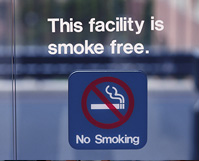 July 28, 2009 - Two patients at high-security Rampton hospital in Nottinghamshire County England maintained the National Health Service (NHS) ban on smoking violated their human right to smoke in their own home. Patients at a psychiatric hospital have lost a legal appeal over the right to smoke following the 2007 smoking ban.
July 28, 2009 - Two patients at high-security Rampton hospital in Nottinghamshire County England maintained the National Health Service (NHS) ban on smoking violated their human right to smoke in their own home. Patients at a psychiatric hospital have lost a legal appeal over the right to smoke following the 2007 smoking ban.
But the Court of Appeal has ruled the policy is lawful and the right to smoke is not covered by the European Convention on Human Rights.
Nottinghamshire NHS Healthcare Trust said patients were given help to quit. The smoke-free policy has been in operation since April 2007 and bars smoking inside and outside at Rampton by staff and patients. Nurses do not want smoking ban in psychiatric wards by staff reporter, PsychMinded.co.uk, 7/21/2006.
Lawyers for the patients had argued that the hospital was their home and to prevent them smoking there when they were not free to go elsewhere to smoke interfered with their rights.
Reference: Patients lose smoking ban appeal, BBC, 7/24/2009.
Read more...
Turkey - cafe owners complain about smoking ban..
 July 28, 2008 - On July 19, 2009 a smoking ban was introduced prohibiting smoking in all indoor areas, including cafes, bars and restaurants. (Law No. 4207, on the Prevention of the Harmful Effects of Tobacco and Tobacco Products, requires that all restaurants, coffeehouses, cafeterias and bars have an appropriate outdoor area if they wish to allow smoking. The ban levies a TL 69 fine on those who smoke in a forbidden zone and a hefty fine of up to TL 5,600 for operators who allow it to happen.)
July 28, 2008 - On July 19, 2009 a smoking ban was introduced prohibiting smoking in all indoor areas, including cafes, bars and restaurants. (Law No. 4207, on the Prevention of the Harmful Effects of Tobacco and Tobacco Products, requires that all restaurants, coffeehouses, cafeterias and bars have an appropriate outdoor area if they wish to allow smoking. The ban levies a TL 69 fine on those who smoke in a forbidden zone and a hefty fine of up to TL 5,600 for operators who allow it to happen.)
A considerable part of society, however, has embraced the new ban, suggesting that the ban comes as a revolutionary step against smoking, which claims thousands of lives annually in Turkey, threatening public health.
Now, a group of cafe owners has applied to the parliamentary Human Rights Commission, demanding that a recently introduced smoking ban, prohibiting smoking in all indoor areas, including cafes, bars and restaurants, be lifted. The most recent challenge of the ban comes from cafe owners, who fear it will ruin their businesses, which have already been hit hard by the economic crisis. The commission sent the application, which underlines that the smoking ban in Europe is far more “flexible” than in Turkey, to the relevant ministries."
Protesting the ban, many bar and coffeehouse owners say the new regulation violates human rights and that the rules are too strict to follow. Resul Karataş, head of the Turkey Cafes, Coffeehouses and Bars Federation, said Saturday that their members are complaining that their business has contracted noticeably since the ban came into effect and were preparing to appeal to the Constitutional Court, demanding that the ban be annulled. “If it continues like this, we fear some 30,000 out of 100,000 current cafes and coffeehouses will have to shut their doors before the end of this year.” Karataş added many cafes had to dismiss employees over the past week. Prime Minister Recep Tayyip Erdogan's Islamic-rooted government is keen to reduce smoking rates and the effects of second-hand smoke on people's health. He insists the battle against cigarette usage is as crucial as the "struggle against terrorism."
Prime Minister Recep Tayyip Erdogan's Islamic-rooted government is keen to reduce smoking rates and the effects of second-hand smoke on people's health. He insists the battle against cigarette usage is as crucial as the "struggle against terrorism."
Reference: Cafe owners demand repeal of smoking banToday's Zaman, 7/28/2009.
Turkey - related news briefs:
Turkey - dangers of secondhand smoke media campaign..;
Turkish Government - makes major move to improve the health of its citizens..;
Turkey - smoking ban starting July 19th will be enforced - these guys are serious..;
Turkey - poll indicates employers, their employees and customers support smoking ban in cafes, bars and restaurants..;
Turkey - July 19th total smoking ban, will employees lose jobs..;
Turkey - on July 19, 2009 will mark the beginning of “100 percent smoke-free air” in this country..;
Turkey - national smoking ban starts July 19, 2009..;
Turkey - quit smoking photo displayed in İstanbul's Taksim Square..;
Turkey - data on tobacco usage - Turkish Statistics Institution..;
Turkey - smoking ban in all bars, restaurants and coffeehouses starting July 19, 2009..;
Smoking ban in Turkey lowers cigarette consumption..; Turkey's ban on pubic smoking goes into effect on Monday, May 19, 2008..;
British American Tobacco (BAT) reported group volume sales up for first quarter 2008..; More on the quick fix for outdoor smokers..;
BAT to Acquire Most of Denmark's ST..;
More on Philip Morris International of the Future..;
WHO Report on the Global Tobacco Epidemic 2008...
Click on smoking ban image to enlarge..
Read more...


To Provide Public Awareness
Purpose
About Us
Contact Us
2008 HIGHLIGHTS
TOPIX PAPERS - 2008 & 2009..
Archive
-
▼
2009 (1446)
-
▼
07/26 - 08/02 (35)
- Bulgaria - Fake Victory Light cigarettes..
- Sri Lanka - Industry gimmick to entice youth to sm...
- Philip Morris USA - more , the test marketing L&M...
- Philip Morris USA may have all fire-safe cigarette...
- Arizona only fire-safe cigarettes sold starting A...
- Denmark - veggie price increases triple that of ci...
- Sri Lanka - huge drop in tobacco smoking..
- Russia - making it more difficult for servicemen t...
- Denmark - smokers being marginalized more and more..
- Japan Tobacco International - Business Results fo...
- Imperial Tobacco sales for year ending June 2009..
- BAT - continues growth in 1st half of 2009..
- Tobacco Control Legal Consortium - facts sheets pr...
- Oregon - electronic (e) cigarettes sales prohibit...
- Philip Morris USA production plant in Cabarrus Cou...
- Turkey - smoker wounds manager and kills his fri...
- More on Camel Dip - a premium moist snuff..
- Belfast, Northern Ireland - nine million counterfe...
- Cigarette packaging is a key marketing strategy fo...
- Fewer Britons support the ban on smoking in pubs t...
- South Dakota - opponents of smoking ban gain a del...
- Wales council imposes blanket ban on smokers adopt...
- Israel bans electronic (e) cigarettes..
- Pregnant women exposed to passive smoke greater ch...
- Australia - NSW - young women binge smoking..
- Czech Republic - pubs and restaurants allow smokin...
- England - patients at psychiatric hospital lose s...
- Turkey - cafe owners complain about smoking ban..
- Ukraine - enforcement of smoking ban, 28,000 peop...
- Philip Morris USA sees decline in health lawsuits..
- Premium Cigar Store Owners Unite to Fight Proposed...
- Galveston, TX - comprehensive smoking ban adopted...
- Pakistan - More, on rollback of the Statutory Regu...
- Lorillard Inc. q2 2009 earnings..
- New Zealand - 1st trial ever of e-cigarettes..
-
▼
07/26 - 08/02 (35)